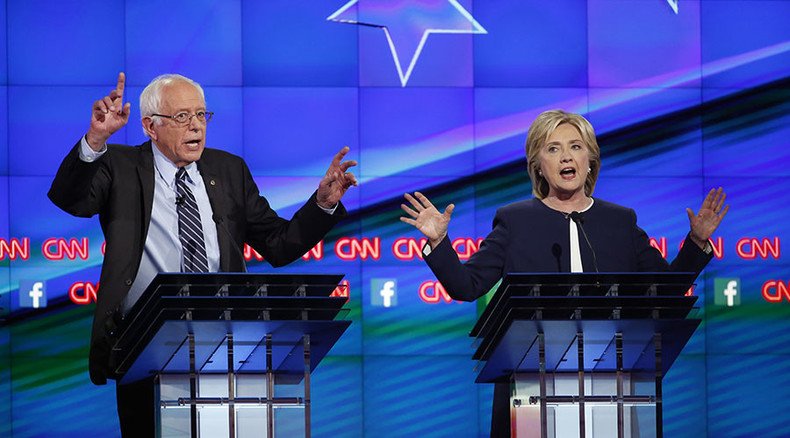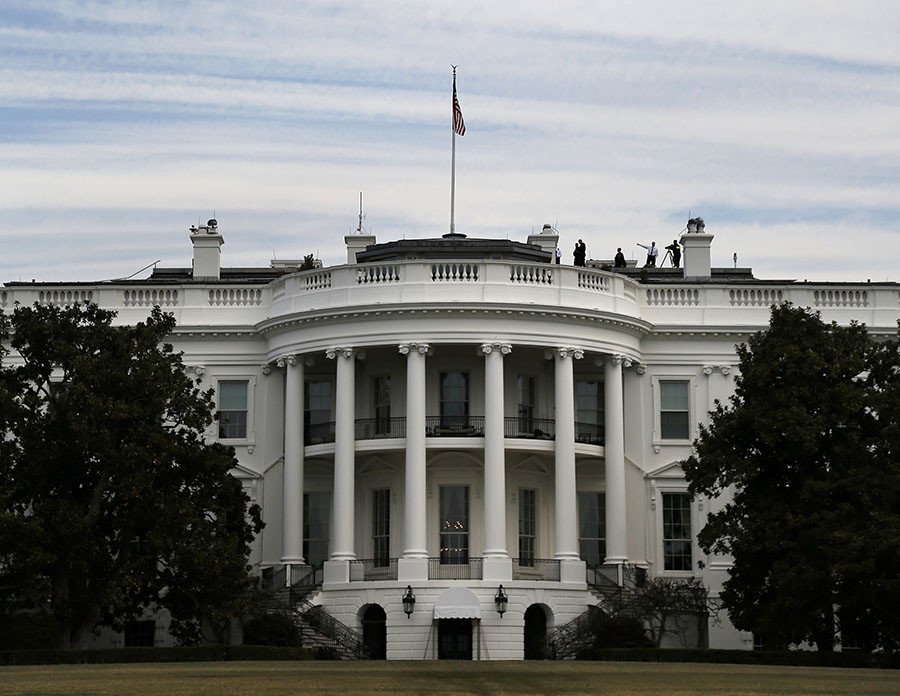'US 2016 race: People sick of politics of personalities, want substantive debate'

People of the US are really longing for some depth in the political discourse, they are sick of politics being about personalities, says journalist and political analyst Caleb Maupin. They want actual substantive debate, he adds.
READ MORE: Presidential campaign 2016: US media 'congenitally allergic' to issues of substance
RT: Hillary Clinton and Bernie Sanders participated in the democratic debate. What do you think of how they are conducting themselves during the debate?
Caleb Maupin: The thing that is very apparent and the most obvious aspect of this debate is the gap between the Democratic Party (DP) rank-and-file and the people on the stage. The majority of the Democratic Party’s base are African American, Latino or not white. However, every single candidate on stage was white. Furthermore, Hillary Clinton represents the establishment of the DP; she comes out of the legacy of the Democratic Leadership Council which pulled the DP significantly to the right in the early 1990s. Bernie Sanders on the other hand represents something much closer to what the average DP activist thinks: he seems to be putting forward a message laced with populism, calling out the rich and powerful.
The debate itself was very much like a rally: we heard many different voices from the stage, we heard the audience applauding numerous times throughout the debate. There was a very broad involvement from the audience. It was very much a political rally; I wouldn’t call it a debate because on serious matters of policy they didn’t seem to be much depth in discussion. And when it came to Syria, the audience and the candidates seem to be unanimous in the belief that somehow Russia was not correct in intervening and fighting Al-Qaeda and ISIS.
6 flip flops from Hillary ‘Real Person’ Clinton http://t.co/1zJcRaaSlzpic.twitter.com/WG5aegF4Tg
— RT (@RT_com) October 14, 2015At one point the candidate [Martin] O'Malley went as far as to actually say: “Assad’s invasion of Syria.” Assad is the President of Syria - how can he invade his own country? It is not a logical statement, but it shows how misinformed the people of the US and the leaders of the DP are about foreign policy issues. Senator [Jim] Webb - this is a man who was in the [Ronald] Reagan administration, was Secretary of the Navy and stepped down because there were not enough ships and there wasn’t enough military spending – repeatedly throughout the debate he called for war against China and was riling up the public to hate China. China is one of the biggest countries in the world and the biggest country of the world in terms of population; and to have a war against China that would be a disaster on the global stage.

RT: Clinton and Sanders have many disagreements they are always ready to emphases. How confrontational have they been so far?
CM: It was interesting; there was kind of a definitive moment when Bernie Sanders said to Hillary Clinton that everyone is tired of hearing about her “damn emails.”
“The American people are sick of hearing about your damn emails, @hillaryclinton" -Bernie #DebateWithBernie
https://t.co/A7Cm5UwHks
— Bernie Sanders (@BernieSanders) October 14, 2015And that shows that people of the US are really longing for some depth in the political discourse, they are sick of politics being about personalities, they want actual substantive debate. And the fact of that remark got so much applause shows how much people in the US, people in the DP rank-and-file are really longing for substantial debate about policy.
The one thing that was rather disturbing was the fact that no one raised - when the discussion was going on about racism - no one could come forward and say that the problem is that police having been given a license to kill. The problem isn’t simply that there is unemployment in the black community; the problem isn’t simply that there is unequal treatment in the justice system; the problem is that the police officers – both white and black – have been given a license to kill people, take their lives and not be held accountable for what they do. And none of the candidates were willing to call out the police for the fact that they have been able to act murderously and not be held accountable for what they do. And that is the issue underlying the whole Black Lives Matter movement. And none of the candidates really addressed it sufficiently. Furthermore, the candidates were unanimous despite disagreeing about troops on the ground; they were unanimous in preaching hatred for Russia and preaching hatred for China.
RT: Bernie Sanders' presidential race as a democratic socialist would have been impossible a couple of years ago. Do you think labels are becoming less important than ideas?
CM: Absolutely. Hillary Clinton is kind of the walking incarnation of the Democratic Leadership Council which drastically altered the policy of the DP in early 1990s similar to what Tony Blair did with the British Labour Party. And Bernie Sanders represents something much closer to what the average democrat believes. People in the US are openly highly critical of capitalism. When Barack Obama ran for president in 2008 he was called a socialist as a slur or an insult. But now Bernie Sanders is running for president of the US openly calling himself a socialist and being very broadly supported by the rank-and-file of the DP. And that shows a real shift in the consciousness in the US. People are questioning the fact that the US economy is centered around making profits for a very small elite. There is anger at the rising police state, there is anger with a drop in the standard of living, there is anger with the escalation of tensions and conflicts around the world. People in the US are really tired of the way things have been going. And this creates an opening for people in the US to fight back and people who are struggling for peace, democracy, civil liberties and against racism to really take action. And the DP is really struggling to kind of contain those struggles. They do not want people in the streets like there were during the Black Lives Matter. They want people in the voting booths counting on the DP politicians to do it for them. And the struggle will be to keep the people in the streets not restricted to the voting booths, not subservient to the DP but actually fighting in their own interests, making real concrete demands on this system and fighting for justice.
#Snowden a hero or traitor? 2016 Democratic hopefuls declare what to do with whistleblower
http://t.co/KZ7tY9BUWGpic.twitter.com/MiJjMx3bv3
— RT (@RT_com) October 14, 2015The statements, views and opinions expressed in this column are solely those of the author and do not necessarily represent those of RT.













